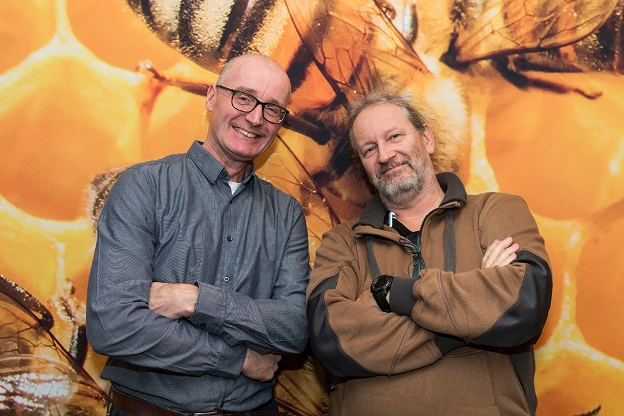Cookies
Van Hall Larenstein treats its customers' information with the utmost care and will never make this information available to third parties. Read more about us Privacy and Cookie Policy


Bees are vital to agro-ecosystems for their role as pollinators of crops and wild plants. When we talk about ‘bees’, many people think of the ingenious honey bee, which on top of producing honey can also be used as a pollinator in fruit cultivation, for example, or in seed production. But there are so many other bee species, and many of them tend to be overlooked even though they’re just as important. Bumblebees, for example, are important pollinators in the wild, but can also be usefully deployed in greenhouses for tomato production. The Netherlands is also home to hundreds of solitary bee species, and these bees, along with bumblebees and honey bees, pollinate a wide variety of plant species and are therefore hugely important for the maintenance of biodiversity.
The Bee Health applied research group was established to run from 2015-2021 with a focus on the welfare of all bee species in the Netherlands. Through partnerships at both the national and international level, it conducts research into apiculture and the varroa mite, and into broader landscape issues affecting bees, pollinators and insects. Professors play a key role in bringing together NGOs, research institutions, land management organisations, apiculture associations and the agricultural sector. Van Hall Larenstein University of Applied Sciences (HVHL) is a partner for the National Bee Strategy, which it signed on 22 January 2018.
It’s widely understood that honey bees produce honey, but that’s not what places this ingenious insect in the top three most important agricultural animals. The honey bee is an important pollinator of crops and wild plants and is essential to agricultural ecosystems and closed cultivation systems. Bumblebees and solitary bees are also important in providing pollination to open crops as an ecosystem service. The Bee Health applied research group is focused on the welfare of all bees: honey bees, bumblebees and solitary bees, whether they’re wild or managed. (Source: The Buzz about Bees, J. Tautz en H. Heilmann, Springer, Heidelberg 2008)
The applied research group in Bee Health has two objectives:
Combining the Bee Health applied research group with the research line in ‘Sustainable crop pollination’, creates more space to address issues arising from the apiculture sector. Professional and amateur beekeepers are all grappling with serious problems in relation to bee health, while our food supply is largely dependent on pollination by honey bees. It’s essential to protect the role of honey bees in pollination and to provide suitable habitats for all pollinating insects.
It’s not just honey bees that are having problems: there’s been a huge overall decline in all pollinating insects. A comprehensive approach is essential if we are to prevent further decline in the pollinating insect population. By expanding the research carried out within the applied research group on Bee Health to include the associate applied research group on Bees and Biodiversity, HVHL can now also focus on improving the landscape for all insects, including bees and honey bees.
Some examples of exciting projects carried out to date:
Everything published by the Bee Health Bijengezondheid applied research group can be found on GreenI, the online library for the green universities of applied sciences.

Frens Pries obtained his PhD from the University of Groningen based on a molecular-biological analysis of a bacterial enzyme that can break down environmental pollutants. He went on to gain substantial experience as a post-doctoral researcher in virology. In 2001, he was appointed as a lecturer in Biochemistry at the Life Sciences & Chemistry University of Applied Sciences Alkmaar, which later became part of the InHolland University of Applied Sciences. Since 2013, he has been involved in bee health, focusing on viruses in bees and the genetics of honey bees, and toxic substances in bee products such as honey and wax. He works with businesses, seed producers, foundations and beekeeping associations. Since 1 January 2019, Frens Pries has also been a professor of sustainable crop pollination at InHolland.
Arjen Strijkstra holds a PhD in Biology and has a long track record of studying behavioural biology in a variety of animals, including humans. As well being an associate professor, Arjen is also a lecturer in Wildlife Management for the Animal Management study programme at HVHL. He works with students on research into wild bees and honey bees, and on their relationship with humans. Arjen is particularly interested in making urban and agricultural landscapes more insect-friendly.
We work with other applied research groups within the university, such as the Meadow Birds and Sustainable Dairy Farming group.
The applied research group works closely with the following study programmes:
The applied research group includes a wide range of people. They work collectively on the challenges set by the group. Below is an overview of some of our staff members:
If you have any questions about the applied research group, please email [email protected].